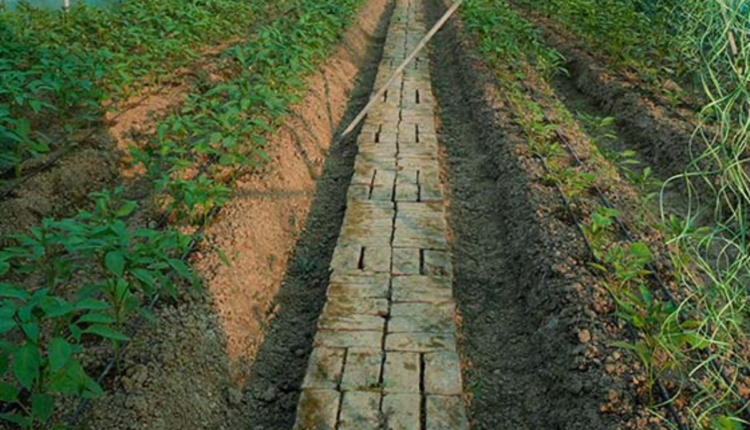Organic Farming: Hemraj Prajapati changed the thinking of the village and his own fate through organic farming
Despite the difficulties, Hemraj Prajapati achieved success by adopting organic farming and inspired the farmers in his area to do organic farming.
Hemraj Prajapati, a resident of Nampura, a small village in Niwari district of Madhya Pradesh, is a hardworking, young and progressive farmer. With his experience and dedication, he has proved that if farming is done with complete honesty and hard work, then it can also become a successful and respectable business. Hemraj has been doing completely organic farming for the last 10 years.
In the beginning, he had to face some difficulties, but he did not give up and gradually achieved success in farming with his hard work. Today he has not only become self-reliant, but is also inspiring many other farmers of his area to do organic farming. His success story has become a topic of discussion in the surrounding villages today.
How did he start organic farming?
Hemraj started farming with traditional methods, but when he participated in a training program (PFSP – Participatory Farmers Support Programme) organized by Patanjali, his thinking changed. In this training, he was taught the benefits of organic farming, techniques and ways to increase profits by reducing costs.
Soon after the training, Hemraj started organic farming in his entire 2-acre farm. He planted seasonal vegetables on 1 acre of land and started cultivating medicinal crops like basil on the remaining 1 acre.
Main crops cultivated
Diversity is seen in Hemraj’s farming. They mainly grow the following crops:
- Bottle gourd, Ridge gourd, Bitter gourd, Cabbage
- Brinjal, Spinach, Coriander, Okra
- Tulsi (a medicinal crop)
The special thing about these crops is that they are grown using organic methods, which improves the taste, nutrition and market value of the produce.
Methods and Techniques of Organic Farming
Hemraj’s farming methods are completely natural and organic. He does not use any kind of chemical fertilizers or pesticides. The main organic methods adopted by him are as follows:
1. Cow dung Manure and Jeevamrit
Hemraj prepares Jeevamrit and Ghanjeevamrit from the cow dung and cow urine available in his own farm. This maintains the fertility of the soil and provides nutrition to the crops.
2. Use of Dashparni extract
To protect plants from insects, they make Dashparni extract which is prepared from 10 types of leaves. It is a natural pesticide which is completely safe.
3. Low cost, high profit
With these organic techniques, Hemraj does not need to buy pesticides, fertilizers or medicines from the market, which reduces his expenses a lot and increases the profit.
Animal husbandry also helps
Animal husbandry has also played an important role in strengthening Hemraj’s farming. He has 2 cows and 2 buffaloes, from which he gets dung and urine every day. He uses this dung and cow urine to prepare fertilizers used in organic farming, such as Jeevamrit, Ghanjeevamrit and pesticide solution.
This saves him from buying chemical fertilizers or medicines from the market, which reduces the cost of farming to a great extent. Due to animal husbandry, not only the fertility of their fields remains intact, but it has also become a means of additional profit. In this way, Hemraj is making organic farming even more sustainable by making better use of natural resources.
Direct Selling in the Market – Direct Connect with the Customer
Hemraj sells his products in the market himself. He goes to the local market held in Niwari district headquarters every Sunday and sells. Apart from this, he also delivers his products to the market of Jhansi. The quality of his crops is so good that customers recognize him and prefer to buy from him. In this way, he has got permanent and good customers from organic farming.
Joined PGS group and got certificate
Hemraj, along with other farmers of the village, has formed a PGS (Participatory Guarantee System) group named “Lucky Farmers Group”. This group is certified by DYMT organization. With PGS certification, his products got organic certification, due to which he started getting better prices in the market.
Be an inspiration to other farmers
Seeing Hemraj’s hard work and success, now more than 40 farmers around are associated with him. They take training in organic farming from Hemraj and are improving their farming under his guidance. Hemraj is also working as an excellent trainer.
How much is the income?
Hemraj’s annual income is as follows:
From the sale of vegetables – about ₹ 1.25 lakh per year
From the sale of Tulsi – about ₹ 40,000 per year
In this way, he gets a total net income of about ₹ 1.65 lakh, which is a big achievement for a small farmer – and all this has been possible due to organic farming.
Hemraj’s thinking – an inspiration for everyone
Hemraj believes that “organic farming is not just a way of farming, it is a way of life.” He learned from his experiences that by adopting organic methods, farmers can improve their soil, health and income. His story inspires us that if we leave chemical farming and adopt organic and natural methods, the environment will be safe and so will the future of the farmer.
Farmers like Hemraj Prajapati show that organic farming is not only beneficial for the environment, but is also an economically sustainable option. Low cost, better quality, and direct access to the market – these three things make Hemraj a successful farmer.
If you are also a farmer and want to make your farming profitable, then adopt organic methods like Hemraj and make your farm prosperous.
Contact details: If farmers want to share information or experiences related to farming with us, then they can do this by calling us on the phone number 9599273766 or by writing an email to [email protected] or by sending your recording. Through Kisan of India, we will convey your message to the people, because we believe that if the farmers are advanced then the country is happy.



